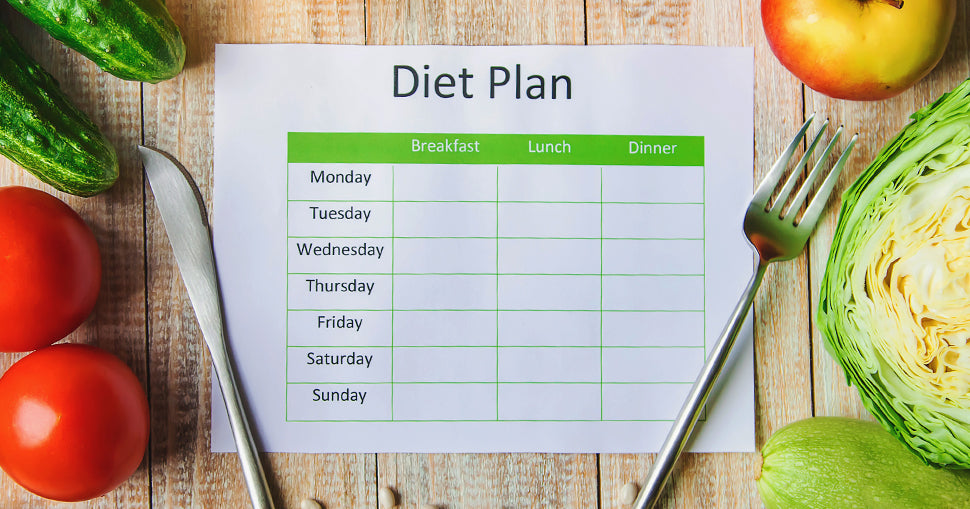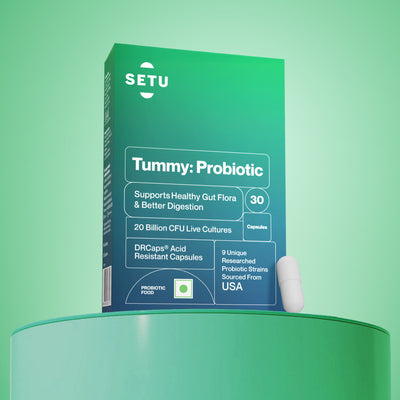Get A Lean Body With This Probiotic-Rich Diet Plan!
11 May 2024
Did you know your gut health plays a HUGE role in weight management?
Gut health has become a trending topic in recent years, and for good reason. An increasing body of research shows that the gut microbiome, the trillions of bacteria that live in your digestive tract, plays a crucial role in overall health and wellbeing. When it comes to weight loss and achieving a lean body, gut health is one of the most important, yet often overlooked factors.
The community of microbes in your gut influence how food is digested, nutrients are absorbed, and weight is managed. An imbalance of good and bad bacteria can negatively impact metabolism, hormone regulation, inflammation, and immunity - all of which make losing weight a challenge. The good news is that making simple changes to diet and lifestyle can improve gut health and create an environment that promotes weight loss.
Turns out, optimizing your gut flora with prebiotics and probiotics can help you achieve your lean body goals. With a healthy gut microbiome, reaching and maintaining your ideal weight can become remarkably easier.
Why is Gut Health Important?
Our gut microbes aid digestion, regulate the immune system, produce vitamins, prevent pathogen overgrowth, and impact weight management. An imbalance in your gut microbiome, known as dysbiosis, can lead to digestive issues, inflammation, weakened immunity, and weight gain.
Poor gut health is often caused by factors like chronic stress, antibiotics, processed foods, and lack of sleep. When the number of beneficial microbes declines, harmful bacteria can proliferate, leading to increased intestinal permeability (leaky gut). This allows toxins, microbes and undigested food particles to leak into the bloodstream, triggering systemic inflammation and weight gain.
Importance of Probiotics
Probiotics can help with various digestive issues. They assist in breaking down food, absorbing nutrients, and eliminating waste. Specific strains like Lactobacillus plantarum and Bifidobacterium lactis help relieve constipation by speeding up transit time in the colon. Other strains like Lactobacillus rhamnosus help reduce diarrhea by balancing the good and bad bacteria. Overall, probiotics promote regularity, reduce bloating and gas, and improve digestive comfort.
Good food sources include:
- Yogurt
- Kefir
- Kombucha
- Kimchi
- Sauerkraut
- Tempeh
- Miso
- Pickles
- Soft cheeses
Benefits of Probiotic Foods
- Enhances gut health
Probiotic foods introduce beneficial bacteria into the gut, restoring balance and promoting a healthy microbiome. This can alleviate digestive issues such as diarrhea, bloating, and irritable bowel syndrome.
- Boosts nutrient absorption
By improving gut health, probiotics aid in the absorption of essential nutrients such as vitamins, minerals, and fatty acids. This can lead to overall better nutrient utilization by the body.
- Supports mental health
The gut-brain axis connects the gut and the brain, and probiotic foods have been shown to positively influence mood and mental health. They may help reduce symptoms of anxiety, depression, and stress.
- Improves skin health
A healthy gut microbiome can positively impact skin health, as probiotics help to reduce inflammation and promote a balanced immune response. This may lead to clearer skin and a reduction in conditions like acne, eczema, and rosacea.
- Supports weight management
Probiotic foods can aid in weight management by influencing the body's metabolism and energy regulation. Certain strains of probiotics have been linked to reduced fat absorption, increased feelings of fullness, and modulation of hormones related to appetite and fat storage. This can contribute to more effective weight loss and maintenance efforts when combined with a balanced diet and regular exercise.
Prebiotic and Probiotic Foods
Prebiotic foods provide the fiber that feeds the good bacteria in your gut. Getting plenty of prebiotics in your diet helps the probiotics flourish. Probiotic foods contain the live active cultures that boost the populations of good bacteria. Eating a variety of prebiotic and probiotic foods is key for optimal digestive health.
Prebiotic and Probiotic Supplements
Prebiotic and probiotic supplements can be a convenient way to increase your intake of these beneficial compounds. Setu’s Lean: Lite Pro+ has a powerful combination of clinically studied prebiotics and probiotics, also known as a synbiotic formula, which supports gut health and weight management. It contains HOWARU® Shape, an effective probiotic strain that has shown to enable 4.5% body fat reduction!
Be sure to follow dosage instructions carefully when taking prebiotic or probiotic supplements for maximum benefits. Consulting a healthcare provider can help determine the best options for your individual needs.
Easy Diet Plan
A healthy gut is essential for weight loss. Here is a 7-day meal plan incorporating prebiotic and probiotic foods to boost gut health:
Day 1
Breakfast: Greek yogurt with berries and chia seeds.
Lunch: Chicken salad with spinach, avocado, and pumpkin seeds.
Dinner: Salmon with broccoli and sweet potato.
Day 2
Breakfast: Oatmeal with bananas, walnuts, and cinnamon.
Lunch: Lentil soup with carrots, onions, and garlic.
Dinner: Turkey burgers with sauerkraut, lettuce, and tomato.
Day 3
Breakfast: Smoothie with kefir, banana, and flaxseed.
Lunch: Quinoa tabbouleh salad with parsley, mint, and olive oil.
Dinner: Baked chicken with roasted Brussels sprouts and brown rice.
Day 4
Breakfast: Frittata with kale, mushrooms, and feta cheese.
Lunch: Chickpea salad sandwich with arugula and avocado.
Dinner: Beef stir fry with bok choy, carrots, and onions over quinoa.
Day 5
Breakfast: Overnight oats with chia seeds, almond milk, and apples.
Lunch: Vegetable noodle soup with shiitake mushrooms.
Dinner: Grilled salmon with asparagus and sweet potato.
Day 6
Breakfast: Scrambled eggs with spinach, tomatoes, and feta.
Lunch: Tuna salad wrap with lettuce, red onion, and dill pickle.
Dinner: Chicken fajitas with peppers, onions, guacamole, and corn tortillas.
Day 7
Breakfast: Berry smoothie with almond milk, flaxseed, and probiotic yogurt.
Lunch: Kale Caesar salad with chickpeas and Parmesan.
Dinner: Veggie stir fry with tofu, broccoli, carrots, cabbage, and ginger.
Conclusion
In summary, gut health is extremely important for overall health and weight management. The gut microbiome plays a key role in digestion, metabolism, hormone regulation, and immunity. An imbalance in gut bacteria is linked to inflammation, weight gain, and other chronic diseases.
Prebiotics and probiotics help nourish and restore healthy gut flora. Prebiotics provide fuel for probiotics to thrive. Together, they improve digestion, boost immunity, decrease bloating and inflammation, and promote satiety. This leads to easier weight loss and maintenance.
Eating a diet rich in prebiotic and probiotic foods is ideal. Some great choices are yogurt, kefir, sauerkraut, kimchi, onions, garlic, bananas, apples, Jerusalem artichokes, dandelion greens, and legumes. Supplements can also be beneficial if food sources are inadequate. Look for broad-spectrum probiotic capsules with diverse strains.
Incorporating prebiotic and probiotic foods, managing stress, exercising regularly, and getting enough sleep sets the stage for a healthy gut and lean body. Focus on whole, fiber-rich plant foods and limit processed items, sugar, and saturated fats. With a little planning, it's easy to nourish your gut microbiome and reach your health goals.
Skin: Renew - Glutathione - Orange Flavour
- ₹1,994
- ₹1,994
-
₹2,600 - ( 23% OFF)
Categories
- Choosing a selection results in a full page refresh.
- Press the space key then arrow keys to make a selection.
this is the sidecart









